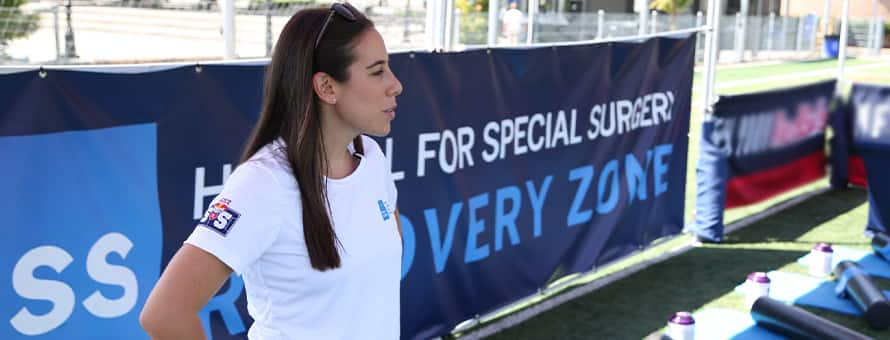The Ultimate Playbook for Sports Management Careers

Understanding the numbers
When reviewing job growth and salary information, it’s important to remember that actual numbers can vary due to many different factors—like years of experience in the role, industry of employment, geographic location, worker skill and economic conditions. Cited projections are based on Bureau of Labor Statistics data, not on SNHU graduate outcomes, and do not guarantee actual salary or job growth.
Relatively few people become professional athletes, but a passion for sports can be channeled off the field into a satisfying career in sports management. Sports management is the business of sports and recreation. From facilities management and event coordination to player benefits, communications and marketing — there’s a lot of work that goes into running a professional sports organization. Earning a master's in sports management can help you get your start in this growing industry.*
In a master's degree program, you’ll explore strategic planning and budgeting, marketing and communications, management concepts and research methods. Sports management coursework will also explore the growth and globalization of the sports market, from international marketing to public policy and ethical considerations.
The North American sports market size has grown from $48.7 billion in 2009 to a forecasted $83.1 billion in 2023, according to Statista. This is driven largely by new trends, such as data innovation in sponsorships, smart venues, sustainability efforts, expanded streaming services and emerging technologies, reported PriceWaterhouseCoopers (PWC) in their 2023 sports industry outlook.
So what is sports administration, and what kind of jobs are available? For those with a sports management degree, there are many opportunities with strong career growth and salary potential.
Here are five sports management careers for you to consider.
 Sports Marketing and Advertising
Sports Marketing and Advertising
![]() Professional and collegiate sports teams have been spending more money in recent years on marketing their programs, working to boost ticket sales, television ratings and sponsorship opportunities. With a host of new sponsors such as sports betting and streaming platforms joining the playing field, the sports-sponsorship market is expected to increase from $63.1 billion in 2021 to 109.1 billion by 2030, according to data from PWC.
Professional and collegiate sports teams have been spending more money in recent years on marketing their programs, working to boost ticket sales, television ratings and sponsorship opportunities. With a host of new sponsors such as sports betting and streaming platforms joining the playing field, the sports-sponsorship market is expected to increase from $63.1 billion in 2021 to 109.1 billion by 2030, according to data from PWC.
With a career in sports marketing, you can create print, radio and television advertisements, manage corporate sponsorships for teams and facilities and build an audience on social media.
According to the U.S. Bureau of Labor Statistics (BLS), advertising sales agents earned a median salary of $58,450 in 2022, and marketing research analysts and marketing specialists earned a median salary of $68,230 in the same period.*
If you are interested in becoming a manager in the field, BLS reported that advertising, promotion and marketing managers earned a median salary of $138,730 in 2022, and the field is projected to grow by 6% through 2032 — a faster rate than the national average.*
 Sports Agent
Sports Agent
![]() Want to work more closely with professional athletes? Consider a sports management career as an agent.
Want to work more closely with professional athletes? Consider a sports management career as an agent.
As a representative for a professional athlete, you’ll work to facilitate meetings with prospective teams, negotiate player contracts and secure endorsement deals. As player contracts continue to grow, many agents also help their clients manage their finances.
BLS reported that agents for sports, entertainment and performers earned a median salary of $137,190 in 2022.* Agents can also earn commissions for finalized contracts, which vary significantly based on the players and sports leagues they work with.
 Athletic Director
Athletic Director
 If you’re passionate about sports and helping athletes succeed, an athletic director job might be the career for you, and a sports management degree could help you get your start in this growing field.
If you’re passionate about sports and helping athletes succeed, an athletic director job might be the career for you, and a sports management degree could help you get your start in this growing field.
Athletic directors work in public school districts to advance school sports or at the collegiate level managing sports programs. Athletic directors manage coaching staffs and competition schedules and often oversee the recruitment of players.
In professional sports organizations, athletic directors manage the training and wellness programs for their athletes, overseeing athletic trainers and other fitness personnel.
BLS reported that postsecondary education administrators, such as those who work in college athletic departments, earned a median salary of $99,940 in 2022.* The field is also projected to grow by 4% through 2032, according to BLS.*
 Sports Data Analyst
Sports Data Analyst
![]() Statistics have long played a key role in sports, used to help determine the recruitment potential for athletes, to inform media coverage and for game-day personnel decisions. As a sports statistician, you could work for a collegiate or professional sports program, collecting, analyzing and disseminating athlete and team data for internal and media use.
Statistics have long played a key role in sports, used to help determine the recruitment potential for athletes, to inform media coverage and for game-day personnel decisions. As a sports statistician, you could work for a collegiate or professional sports program, collecting, analyzing and disseminating athlete and team data for internal and media use.
Data analysts are poised for strong growth in the sports industry, with more teams using data to drive customer engagement, help teams win, expand partnerships and more, according to Forbes.*
Statisticians earned a median salary of $98,920 in 2022, according to BLS, and statistician roles are projected to grow by 32% through 2032.*
 Facilities and Events Coordinator
Facilities and Events Coordinator
![]() Sports organizations need a strong facilities and events team to ensure their fields and stadiums are well maintained and to keep game-day operations running smoothly. With a degree in sports management, you could find work as a facilities or events coordinator.
Sports organizations need a strong facilities and events team to ensure their fields and stadiums are well maintained and to keep game-day operations running smoothly. With a degree in sports management, you could find work as a facilities or events coordinator.
Administrative services and facilities managers earned a median salary of $101,870 in 2022, BLS reported, and the role is projected to grow by 5% through 2032.*
Facilities managers, in particular, will be in demand as more organizations seek to reduce their environmental impact and boost energy efficiency.* As the facilities manager for a professional sports organization, you may be responsible for overseeing grounds and maintenance crews, working with security officials to maintain facility safety and supervising guest services employees.
Find Your Program
Is a Sports Management Degree Worth It?
For some, earning a sports management degree can be their first step into the sports industry. For Adrian White '23G, a sports management graduate from Tampa Bay, Florida, earning his degree was about something greater.
After working for 22 years in the sports and recreation field, White became disabled due to a lung transplant. Earning his master's in sports management was about overcoming life's challenges and working towards his goals of becoming a sports agent and helping kids with their sports and educational journeys.
While the sports management field may be growing, figuring out a sports management degree's value involves making sure the degree aligns with your career and life goals.*
![]() Vincent Tolbert '23 is a sports management graduate from Chicago, Illinois, whose passion for sports opened his eyes to the potential of a sports management degree.
Vincent Tolbert '23 is a sports management graduate from Chicago, Illinois, whose passion for sports opened his eyes to the potential of a sports management degree.
"I believe this (sports management) degree will be a better opportunity to put myself and my family in a better position," Tolbert said.
While earning his degree Tolbert focused on time management skills to meet the needs of his busy schedule. From working multiple jobs to mentoring in youth programs to training for powerlifting competitions, he still managed to complete his schoolwork. With his mom, sister, grandmother and friends' support, Tolbert crossed the finish line with his degree. He's edging closer to his dream of becoming a groundskeeper for a professional baseball or football team.
"I believe I'll be able to follow my passion and be able to be in the sports world," Tolbert said. "That's something I always dream about and now have the chance to become a reality."
Discover more about SNHU’s sports management degree: Find out what courses you'll take, skills you’ll learn and how to request information about the program.
*Cited job growth projections may not reflect local and/or short-term economic or job conditions and do not guarantee actual job growth. Actual salaries and/or earning potential may be the result of a combination of factors including, but not limited to: years of experience, industry of employment, geographic location, and worker skill.
Danielle Gagnon is a freelance writer focused on higher education. She started her career working as an education reporter for a daily newspaper in New Hampshire, where she reported on local schools and education policy. Gagnon served as the communications manager for a private school in Boston, MA before later starting her freelance writing career. Today, she continues to share her passion for education as a writer for Southern New Hampshire University. Connect with her on LinkedIn.
Explore more content like this article

For Jazzmen Shipp, Earning a Degree Changed Everything

How Kellsie Goodhart-Jones Earned an MBA While Working for the US Air Force

What Jobs Can You Get with a Business Degree?
About Southern New Hampshire University

SNHU is a nonprofit, accredited university with a mission to make high-quality education more accessible and affordable for everyone.
Founded in 1932, and online since 1995, we’ve helped countless students reach their goals with flexible, career-focused programs. Our 300-acre campus in Manchester, NH is home to over 3,000 students, and we serve over 135,000 students online. Visit our about SNHU page to learn more about our mission, accreditations, leadership team, national recognitions and awards.


